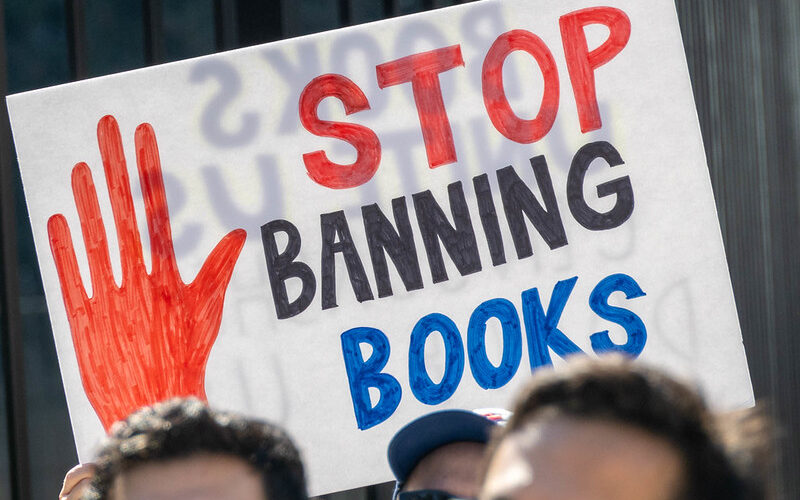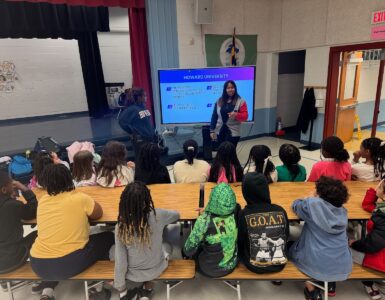A protest sign from a book-banning rally in Atlanta, Georgia, this past February. (Courtesy/John Ramspott)
For those familiar with Ray Bradbury’s “Fahrenheit 451,” the act of banning books is no stranger.
In fact, this is what makes Bradbury’s piece fall under the category of “dystopian.”
According to America’s current regulations, banning books is in no way, fashion or form, ‘dystopian’, and although we have not reached the act of setting books ablaze, we have excelled in outlawing very specific types of literature in very specific areas of the country.
In Ta-Nehisi Coates’ newest book, The Message, he ventures to South Carolina to report on his own book’s banning. In an episode of NPR’s Up First, Coates discussed the implications of banning books which impacts readers, not the author.
“The people that are really hurt are the children and the students there. And they’re not necessarily hurt because they need to be exposed to, you know, my voice or my books, you know, or whatever, or they need to adopt my politics or my particular view of the world,” Coates said during the podcast.
On Tuesday, Nov. 26, Sen. Mike Rounds, R-S.D., introduced a bill to eliminate the Department of Education, reflecting a pledge made by Republican presidential nominee Donald Trump during his reelection campaign.
Trump vowed to close the department in an effort to restore what he describes as conservative values, a move that could further tighten restrictions on books addressing topics like race, sexuality, and gender.
A recent report by PEN America found that book bans surged nearly 200% during the 2023-24 school year. Many of the banned titles address topics such as sexuality, substance abuse and mental health—topics relevant to students navigating a rapidly evolving world shaped by technology, deepening political divides, and an unpredictable future.
To mark Trump’s latest term and the release of Howard University’s very own alumnus Ta-Nehisi Coates’ newest novel, we’ve curated a list of our favorite banned (and challenged books), and why they deserve a place on your reading list.
- “Beloved” by Toni Morrison
A haunting tale about the enduring impact of slavery, a woman who has escaped enslavement is haunted by the ghost of her deceased daughter.
- “The 1619 Project” by Nikole Hannah-Jones
A collection of essays, poetry, and fiction that reexamines American history by centering the legacy of slavery and the contributions of Black Americans. It challenges traditional narratives and highlights the profound influence of slavery on all aspects of society.
- “Stamped: Racism, Antiracism and You” by Ibram X. Kendi and Jason Reynolds
A powerful and accessible exploration of the history of racist ideas in America, offering readers tools and insights to identify and challenge racism in themselves and their communities.
- “Hood Feminism” by Mikki Kendall
This book reframes feminism through the lens of intersectionality, arguing that mainstream feminism often overlooks issues like poverty, hunger, and racial inequality that disproportionately affect marginalized communities.
- “Their Eyes Were Watching God” by Zora Neal Hurston
This novel follows a Black woman as she navigates love, independence, and self-discovery.
- “All Boys Aren’t Blue” by George M. Johnson
A memoir-manifesto that chronicles the author’s experiences growing up as a queer Black man. It offers honest, poignant reflections on identity, masculinity, and family.
- “The Bluest Eye” by Toni Morrison
This novel tells the story of Pecola Breedlove, a young Black girl who yearns for blue eyes, believing they will bring her love and acceptance. Morrison examines themes of beauty, racism, and societal oppression.
- “The Hate U Give” by Angie Thomas
This young adult novel follows a Black teenager who witnesses the police shooting of her unarmed friend. It addresses systemic racism, police brutality, and the power of community activism.
- “I Know Why the Caged Bird Sings” by Maya Angelou
A lyrical autobiography recounting Maya Angelou’s early life, touching on themes of racism, identity, and resilience as she finds her voice through literature and art.
- “Song of Solomon” by Toni Morrison
A richly layered story about a man on his journey to uncover his family’s heritage and his own self-identity.
Although these book bans lack literal flames, unlike Bradbury’s novel, they still burn through the educational and emotional growth of students. Book bans silence stories that foster social understanding and development. The books listed here are more than literature—they are essential voices in the fight against censorship, reminding us that knowledge is a freedom worth defending.










Recent Comments